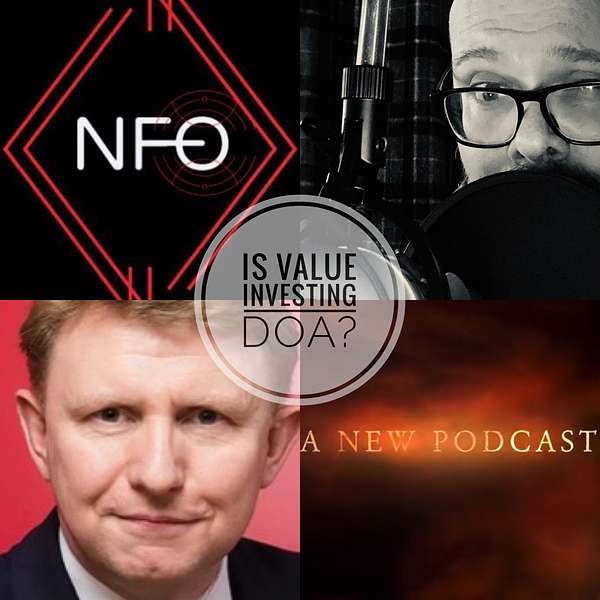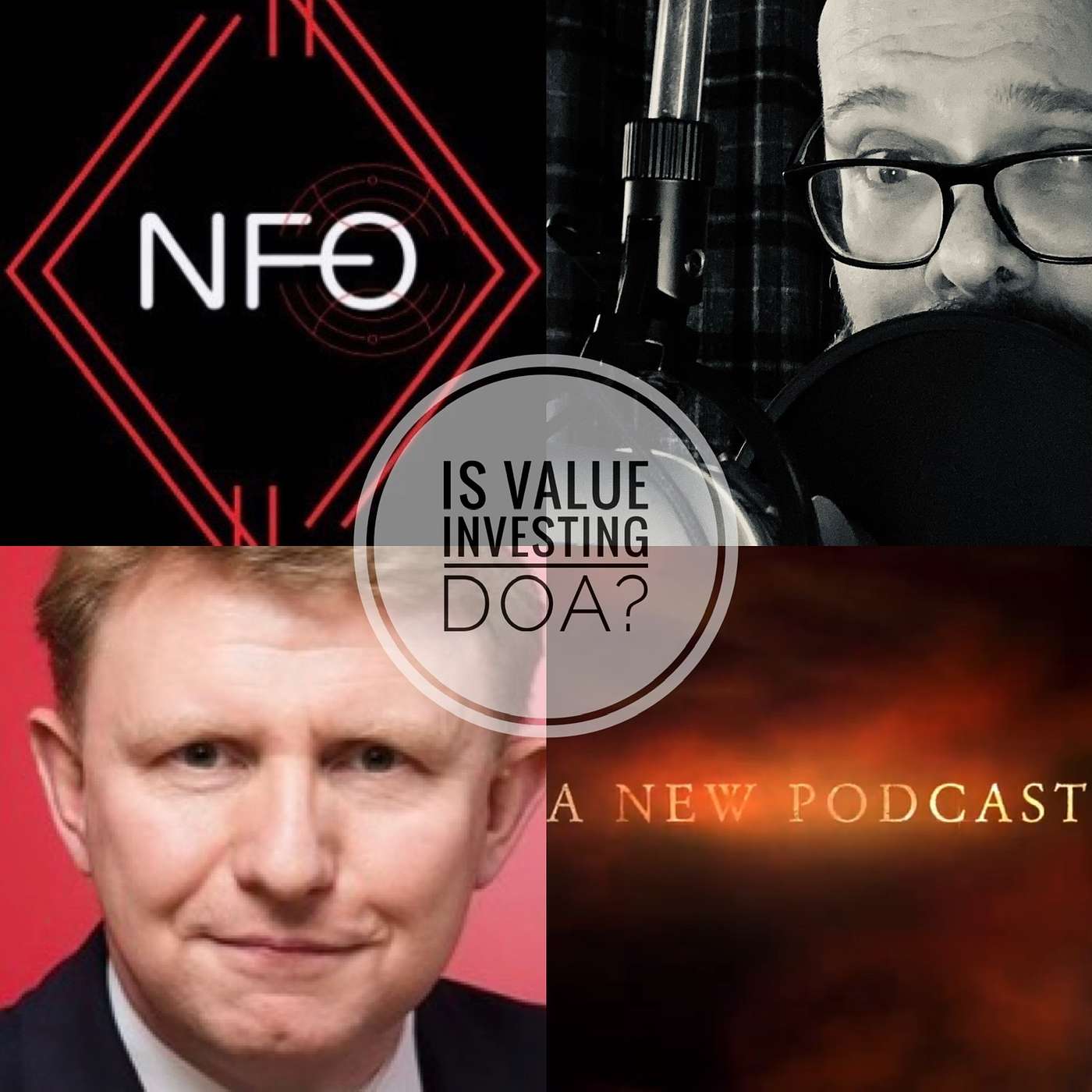
The New Fund Order
Deep from inside the City's shadows... author, speaker, NED and ex investment gatekeeper Jon 'JB' Beckett explores the Industry's taboo and hot topics. Dear Citizens of the People's Republic of Podcast, welcome! The New Fund Order is here; from existential risk to the human condition, a contrarian exploration of the Darkside, the Frontier and the Fringe of; Asset Management, Finance, Fintech, Mutual Funds and Macro. Bringing you news, views and interviews. Like a philosophy-economics mash up with science fiction, B-movies, Kung Fu films, cold war spy films, to Spaghetti Westerns... all delivered from the left-field with an Orwellian chill.. #newfundorder ALL VIEWS ARE INDEPENDENT. PLEASE check out my book website: https://www.blurb.co.uk/b/7337318-newfundorder-2-0 and Youtube channel https://www.youtube.com/channel/UClzN8gpccuVtdfW47TM_pPQ Season 2 ‘Fight Club’ is here ...
The New Fund Order
From Alpha to Omega: Is Value Investing Dead on Arrival?
Welcome to the New Fund Order. An Orwellian journey into the Darkside, the Frontier and the Fringe of Finance.
This is ground zero Citizens: on episode 001 we discuss value investing. Alpha or Omega? Is it the Beginning of the End or just the End of the Beginning?
Fund selectors, advisers and investors have struggled to find Value equity funds that have persistently outperformed the main market against the momentum of; growth stocks, index funds and Big Tech. In the face of secular change, and pandemics, was Value just pronounced D.O.A.?
Join me and guest Morningstar Chief Investment Officer Dan Kemp as we debate the issues and whether value investing is now a question of faith.
Together with left-field opinion, global market news and latest views, direct from my dystopian bunker. In the Air, on the Ground, on the Street and around the corner of Debate. Watching, listening, in the Shadows and on your Airwaves. For Fund Selectors, distributors, wealth managers and investors.
In association with my sponsor Allianz Global Investors (AGI) one of the world's leading active managers. My thanks to my guest Dan Kemp and Morningstar.. and you dear listener.
Please LIKE, SHARE and SUBSCRIBE. Please leave a REVIEW and let me know what you think and what topics you would like for future episodes. Until then... stay safe and.. keep it left-field!!
That's 20 episodes, 20 Guests, every 2 weeks... each episode is 25 minutes!
Join the NFO Army Citizen, https://www.patreon.com/newfundorder
Left-field Finance.
#newfundorder
Credits;
George Orwell 'Nineteen-Eighty Four', Public Domain 1.0.
Speech extracts used by Soundbible.com. Creative Commons Attribution 3.0 and Public Domain 1.0.
All Music used by Silvermansound.com Attribution 4.0 International (CC BY 4.0)
Active is: Allianz Global Investors.
Disclaimer: This post contains affiliate links. If you make a purchase, I may receive a commission at no extra cost to you.
[public domain 1.0 sound recording] President Eisenhower 0:07
Governments derive their just powers from the consent of the governed.
JB Beckett 0:13
Salutations Dear citizens as we peer into the newfundorder to discover the immutable truth for asset management and wealth managers. The lowdown from the dark side, the frontier and the Fringe of Asset Management and fund research.
In the air on the ground, on the street, and around the corner of debate, like the podcast equivalent of the 80s spy film watching, listening, in the shadows and on your airwaves,
A podcasts for wealth managers, funds selectors, distributors and investors bringing to you the People's Republic, podcast of finance. In association with my sponsor, Allianz global investors, news, views and interviews with leading minds,
[public domain 1.0 sound recording] President Eisenhower 1:23
solving the problems of civilization and facing the coming of a universal brotherhood, a republic, which shaped throne and dissolved aristocracy by its silent example, and give light and inspiration to those who sit in darkness.
JB Beckett 1:41
The Theme citizens is..
Value investing.
And I'm especially pleased to introduce today's guest, Dan Kemp, Chief Investment Officer for ma Morningstar Investment Management Europe, Dan describes himself as an experienced multi asset fund manager, an analyst with a strong track record across both conventional and alternative asset classes. He is indeed a well known investment commentator. And I've had the pleasure of many exchanges and conversations over the years about the future of fund research selection, asset classes. And of course, today's topic about value equity investing, it's fair to say that Dan's background is somewhat interesting. He studied a BA in theology at King's College London, he has held a number of roles including fund manager head of fund research at Williams de Broe, was a multi asset fund a fund manager that saltus then before moving as a partner at Albemarle Street Partners, before becoming co head of investment consulting and of course, then Chief Investment Officer at EMEA at Morningstar Investment Management.
And in these strange pandemic lockdown times, rest assured that all guests are calling in remotely. And it's great to have you aboard as my first guest on the newfundorder podcast Dan. And a Happy New Year to you
Dan Kemp 3:18
JB..... happy new year to you.
It's fantastic to be a guest on our new podcast, I really, really looking forward to it
JB Beckett 3:25
well, I felt I had to start with someone particularly special
Dan Kemp 3:28
BUT... you Couldn't find them. I know [laughter-applause]
JB Beckett 3:37
Read into that as you wish. But I felt it was a fitting way to start this. And you know, the whole point of this podcast is really to try and dig into a number of the issues that you and I have had to contend with through our careers as fund allocators. So with that in mind, let's start with the the first question Dan if we make life after death, and as someone who has studied theology Dan is continuing to select value style fund managers no more a question of divine faith? Or are there still very good practical reasons to invest? Is there still a pulse?
Dan Kemp 4:15
That is a great question JB and as as ever with deep questions. There's a lot of different answers, different levels of depth, we can dive in, and we don't have that much time. So I'll just spring straight in and do I think there is still life in the idea that as investors, we should look for assets that will give us above a normal rate of return because they're unjustifiably priced cheaply. And should we avoid or reduce our exposure to assets that look as if they do live a lower term because their current price is too high? Well, absolutely. That is the basis of investing and ultimately on investing. Over the long term with some thought has a valuation element. The key is how you calculate that value, how you apply that, to some extent, what your time horizon is realising that. So if you're looking at a company that is currently very undervalued or appears to be very undervalued, then that really tells you nothing about returns over the next days, weeks months, you're really thinking that in terms of the next 3.4.5, or even 10 years, which, if you're saving for your retirement, most people, that's great. But if you're worried about what your performance numbers are going to be over the next month, then has no relevance. And so, yes, I believe that there is an enormous amount of life left in value, I see it as much more attractive today than it was two years ago. It really depends on how you're finding value and what you're looking for.
JB Beckett 6:08
Yeah, but you were also chatting to your own Holly Black a few weeks ago on Morningstar TV, and you said, 'I think we have to start with value'. And it's for some been quite a 'dirty word', which I thought was an interesting use of phrasing, you know, because frankly, because, you know, so many so called value managers have performed pretty poorly. And you make the link because of that popularity, that enthusiasm for growth stocks, particularly technology stocks, I just wonder if you felt that, you know, this was happening well, prior to lockdown, did big tech, somehow break value?
Dan Kemp 6:45
Well... I think big tech has changed the way that people think about value, because companies have fundamentally changed in the era of technology in general, not just and so what we saw as you go back 10,11, 12 years is really versus peak value investing. And since then, it's been much more focus on Firstly, the stability of earnings growth. More recently, the possibility for ever greater levels of ever greater levels of earnings and innovation. And, of course, you can apply a valuation lens to all of these types of opportunities. But what may have changed is the way that we think about a company, and so in, in the past, where we've looked at a company, and they have to make a certain number of widgets, and they make a profit on each one of those widgets. And so you can look at the margin change, having capital investment delivers a return. And what what big tech has shown us is that we live in a world with much more leverage in terms of innovation. And so businesses can grow and margins at much faster rates, because they're not producing each individual widget, they're allowing millions and millions of people to access the system and reaches huge audiences. Were very quick. So it's maybe changing some metrics that people are using changing people's expectation about new aversion, but change the fact that there are still a price of these this is a price to every business that applies to every asset that really an investment. The question is whether when you look at these companies now, there's so much optimism into business models still look very expensive, even when you take into account this change in business model. I think, again, the rise of big tech, what's happened to the capital markets over the last 10 years has shown us that value can be broader than maybe people are still looking for value as an investor, even if it's characterised in a different way.
JB Beckett 9:33
Yeah, but that got me thinking Dan. And as much as tech stocks are gorging on both the innovation of those companies, the rising user base, and of course, the, you know, to some degree, in effect, it's an overused word and in our society, but the exponential growth in terms of computing power, and I wonder if all that is happening, so much quicker than that. Natural value cycle is that part of the problem, that they have become too short term thinking, in order to have the patience to realise, you know, traditional value in companies other than just technical stuff.
Dan Kemp 10:13
The situation is, is actually, as you say, quite fast in some ways people are now chasing, quote unquote stocks, technology stocks, because they've seen these recent very strong returns, call people short term focus. But if you think about a technology company or technical sector as a whole, then some of the valuations are so extreme, you can't make short term, you have to be extremely long term, you have to assume that some of these technology companies will grow at their current rate faster than the long period of time before you can justify your current valuation. And it was one of the reasons people think you can do that is because interest rates are so so low. And so the more you back end growth and returns the discount back, I have very low risk free rates, then you end up with these high valuations to essentially people, it really analysed why they're not being too short term, to long term in expecting the world to just carry on the way far, far into the future. Whereas your life typically there is a cycle in popularity, runs for a few years. And things that were formerly popular become unpopular, things that were formerly under popular because of changes in the market, it might be changes at a country level or asset class level. Or it might be just changes in Sector level or even sub dominant companies. And so yes, there is a cycle. And even over the last 10 years, we've seen a couple of these cycles. So we saw Russia being very unloved, to being quite popular. A couple years ago, we've seen Korea, South Korea move more recently go from being very loved, as people worried about the semiconductor cycle to now be quite, quite popular last month or so we saw energy companies hire Long's only sees an issue to a cycle. But as we stand today, it was what we remember most of all, is what's just happened, which has been that rise in technology of the most dominating for us being that is the end of it.
JB Beckett 13:04
I wonder if it's the.. confusion is probably the wrong word, inability, I guess, to perceive the rate of change relative to expectations as to whether or not an investment should return? Is the problem with the value fund managers? Or is the problem with advisors, fund selectors and wealth managers selecting volume managers, and not appreciating the differences between say, a deep recovery volume manager and say something that's more, you know, Buffett modern value or even more towards Greenblatt relative value.... of not necessarily looking inside the tin enough?
Dan Kemp 13:41
Well, I think it's beholden on all of us to look inside the tin to look under the hood as much as we possibly can. But... But I don't think we can only blame investors or just blaming investors for this because obviously, what we've seen in the past is people using funds that maybe take an extreme valuation driven approach as the core part of their portfolio. Whereas in reality, it was more of a niche that you can really call out those names and funds I'm sure equally now, arguably, we have concentration in tech and growth stocks, which people take as a core holding which lasted probably in 1998, 1999, 2000, which may not again.. so these things do come in waves, of course, and we are influenced by past performance they are by this idea of extrapolation of how things have been recent past. I think the industry has ever has to have a degree of responsibility that we have to acknowledge, what type of markets favour, a type of strategy, what period we're looking at or investment we're working to make our returns, and how we'll be judged as well how wanted to be judged, I think there's so important for investors to understand what they are buying.. for professional investors to explain what it is they are doing, when it's likely to do well,
JB Beckett 15:32
and that kind of segways quite nicely, you were also talking to holy about, the, I guess, the Active Passive paradigm, to give it some dramatic emphasis, but also in index investing and ETFs have been changing the game to some degree for value investing. Do you feel that the fortunes of active management as a whole are somehow extricably linked to value investing?
Dan Kemp 15:57
I think that's a really, really important point. And not one talked about enough and really glad you've raised it because it goes back to my first point, to some extent, almost all investing is value investing, if you're taking a long term approach, obviously, we have we have momentum trades, ...thinking that why investing i a particular asset class.. So when you're taking a cross section of active managers that typically they are thinking about about value, assets, value is more likely to be part of the investment process.
Even if, as you mentioned earlier, they're looking for relative value or undervalued growth stocks. So there's all different ways that you can think about value. And so yes, what we've seen over the last few years is the dominance of market cap weighted index investing alongside the underperformance or, and those two things, to some extent, go together, I don't want to overplay the complication.. Partly because, of course, the cohort of managers change through time as well. So managers have been running poorly performing strategies tend to drop out and new managers running hot strategy drop in so don't take any predictions on this. But I think as you look at some of the major market indexes, particularly US, a small number of technology stocks dominate that market that I can't remember, in my working life, gets back a little bit more than I'd care to confess.. So we really very unusual situation. Being UK based investors, we're aware that the UK markets typically are quite high concentrated, we've tended to look at the US market as being less high concentrated. whereas Now. We're seeing that in the US. And so you get exposure, overweight-exposure to attractively priced assets, for example, energy companies or some UK banks, without taking very high specific levels of risk. so it's quite an appetising situation for active managers.
JB Beckett 18:35
It sounds as if there, there are some grounds for salvation here Dan. And that, you know, perhaps we should just keep the faith a little bit longer.
Dan Kemp 18:43
BUT in this case, I don't think it's an article of faith that it's purely the application of logic and behavioural science, as you say you spend so much time, doubting what logic, we must accept that if you pay a price that's too high for an asset class, then time is against you. And if you pay a price that's too low for an asset class then time is on your side. And I think people forget that, because we look backwards, and we see recent past performances. And again, we're looking back over a period of where values genuinely underperformed growth, but we have to really dig into how you find value and how to find growth in that situation. Let's just take it as read the values has been quite a short term period, where it's been really painful to focus on valuation for most people. Investment horizons are longer than that... and as soon as I say faith, incredibly important that this isn't about faith in my Mind... it's about trying to overcome the behavioural biases that we all have to wrestle with every day, relying on the logic of the essence of pay too little something than too much and then allow all the fashions and the noise around you to just drop it,
JB Beckett 20:20
So Dan before we let you go I'd really like you to try out our new rapid fire round mainly because if it goes really badly I can try and improve it for the next guest.
Dan Kemp 20:29
This is terrifying for someone like me JB... I like to hedge
JB Beckett 20:36
if you're ready, we shall start.
Dan Kemp 20:39
Excellent
JB Beckett 20:41
So number one, bull or bear?
Dan Kemp 20:44
Bull
JB Beckett 20:46
Bogle or Buffett?
Dan Kemp 20:48
Bogle
JB Beckett 20:49
profits or planet?
Dan Kemp 20:51
Planet
JB Beckett 20:52
Divest or engage?
Dan Kemp 20:56
Ohhhhh crumbs....
I'm going to go with.. divest
JB Beckett 21:01
Lower cost or better value?
Dan Kemp 21:04
[laughs] lower cost
JB Beckett 21:06
Here we go.. supertankers or boutiques?
I think I need the countdown music [music]
Dan Kemp 21:14
Sorry.... boutiques
JB Beckett 21:15
Star managers or team players?
Dan Kemp 21:18
Team players
JB Beckett 21:19
Public or private?
Dan Kemp 21:21
Private
JB Beckett 21:22
High growth or stable income?
Dan Kemp 21:24
Stable income.
JB Beckett 21:26
And here's my particular favourite doozy, socialism or free markets?
Dan Kemp 21:30
Ah, oh, crumbs. free markets. Can I just highlight how many inconsistencies which I could claim was nuanced, but we're not going to have time to go into that..
Unknown Speaker 21:49
[Bonus Round] Now if you can pick a number between 11 and 40.
Dan Kemp 21:55
21
Unknown Speaker 21:56
Question 21.. AI or human intelligence?
Dan Kemp 22:04
Human intelligence.
JB Beckett 22:05
[gong] So that marks the end of our interview. You have survived the newfundorder. Thank you very much, Dan Kemp. It's been an absolute pleasure to have you on board.
Dan Kemp 22:15
It's been great to be with you. I'm delighted to be the first guest.. Thanks JB
JB Beckett 22:22
Fantastic. Thanks, Dan.
Please don't forget to like and share and subscribe you know, click the subscribe button, a new podcast every two weeks with a new guest. Stay tuned.
Market news.
Europol has just reported that dark market the world's largest illegal dark web marketplace has just been taken down the vendors in the marketplace mainly traded drugs sold counterfeit money stolen or counterfeit credit card details anonymous SIM cards and malware. Meanwhile, the UK FCA issues warning on cryptocurrencies as Bitcoin volatility continues, this is echoing ECBs Christine Lagarde as billions were stolen in blockchain hacks. Last year, Tesla hit 800 billion capitalization for the first time and joins s&p 500 index while ETF stream notes the ESG conundrum of admitting Tesla into S&Ps ESG indices given inconsistencies between MSCI and footsie Russell Forbes reports that a group of investors worth $2.4 trillion suspect HSBC of greenwashing, as it continues to fund coal projects despite pledging to go carbon neutral as more companies than ever are reporting Amazon as a risk factor in the reports, data provided by Sentio. Vanguard passes $7 trillion in assets under management for the first time. And that's the end of the news.
JB Opinion - Value Investing
So what do you think listeners is value investing dead on arrival as someone who got into fund research and selection in the late late 90s, early 2000s. So very much going through the dot.com bubble, then the subsequent burst, I have to recognise that hardwired a number of biases towards value funds, and I think a number of other fund selectors of my generation are probably predisposed to the same thing. And so we can contrast that with the next generation coming through what they recall is, over 10 years of growth and momentum dominance led ostensibly by big tech.
[public domain 1.0 sound recording] President Eisenhower 24:17
The power of money is ever present, and is gravely to be regarded. Yet in holding scientific research and discovery in respect, as we should. We must also be alert to the equal and opposite danger, that public policy could itself become the captive of a scientific technological elite.
JB Beckett 24:43
Thanks to you, dear listener for tuning in, brought to you by my sponsor, Allianz Global Investors. A warm thanks to today's guest.
Legally, I am compelled to remind everyone that all views of this podcast are independent and did not belong to any affiliation or organisation Just in case that was in any doubt. Tune in for the next podcast every two weeks from the newfundorder.
Please subscribe, share, like and comment. Let me know what you think and what you'd like covered in future episodes.
Till then stay safe and keep it left field..
Transcribed by https://otter.ai





